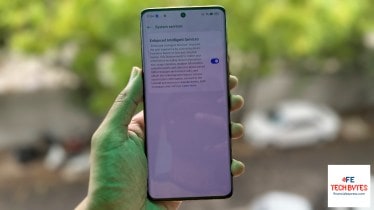Realme phones may be stealing your data. Now, all smartphones (and most apps) have some sort of data collection mechanism involved, under the general argument that it is required to offer better services and experiences and mostly it’s opt-in but Realme seems to be doing this by default which is to say that users— those who bought its phones— have no way of knowing they’re being tracked unless they head over to a particular setting and turn it off manually. The news has triggered a storm on social media, even caught the eye of the government and a probe has been initiated.
The controversy began after Twitter user Rishi Bagree (@rishibagree) spotted a feature called “Enhanced Intelligent Services” buried deep within the settings of the Realme phone he was apparently using and reported it on the micro-blogging platform. Indeed, such a “feature” exists and is enabled by default on Realme phones, Financial Express online has independently confirmed, though as we mentioned earlier, it’s not somewhat easy to find. It appears under Settings > Additional Settings > System Services.
In Realme’s defence, the brand mentions every bit of data it’s presumably collecting explicitly under the feature’s description. It’s quite a lot, to an extent, it should set alarm bells ringing for privacy advocates. Based on Realme’s “disclosures”, it is tracking users’ location and— this the scarier part— connecting to the internet and reading their calendar events, call logs and SMS messages. Or at least, it has the right to do it, since the setting is on by default. Potential tracking also extends to users’ app usage statistics. Realme says, this data is collected to improve device functions and user experience based on how users’ use their device, mainly by optimising the charging and providing personalisation features including wallpapers.
Bagree says “Indian users are kept in dark to share their data without their consent. This is basically forced consent, since it’s on by default,” and questions “Is this data being sent to China?”— a question that Realme will have to answer, sooner the better. Multiple responses to the tweet seem to suggest that Realme isn’t the only BBK Electronics brand that may be secretly stealing user data. Oppo phones, too, have the Enhanced Intelligent Services feature enabled by default, and so do OnePlus phones. Financial Express online can independently confirm this claim too.
Since Realme, Oppo, and OnePlus all share the same codebase, it looks like this is a ColorOS thing. We haven’t found the feature in any Vivo (also owned by BBK) phone at the time of writing. By extension, this applies to iQOO phones as well. Vivo (and iQOO) phones, for context, run FuntouchOS.
Realme came under the scanner late last year when it started monetising ads with the Realme 10 Pro series after years of mocking Xiaomi for doing the same thing. The real problem was the quality of apps being recommended. It was only after multiple reviews pointed it out that the brand “identified a batch of applications through keyword searches and blacklisted them” and started “working to come up with a permanent solution to moderate app recommendations” on all devices.
Ad-based monetisation isn’t unheard of. It’s one of the ways brands subsidise their phones to get you high-end specs at rock-bottom prices. Xiaomi was not the first brand to do it, but it surely got everyone talking about the potential downsides of such a strategy. It has previously also been accused of tracking the private incognito browsing data of Mi and Redmi users without their consent.
